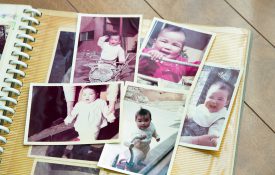-
What Babies Know About Their Bodies and Themselves
We are accustomed to thinking about the importance of what even very young babies see and hear, but “touch is the first sensory system to develop in the baby’s brain prenatally,” and is quite well developed by the time the baby is born, said Andrew Meltzoff, the co-director of the Institute for Learning and Brain Sciences at the University of Washington. Dr. Meltzoff was the first author on a study published in late June in the journal Developmental Science, which looked at how 60-day-old infants’ brains responded when different parts of the body were gently tapped. “We know relatively little about how the infant brain responds to touch,” Peter J.
-
Is Working Remotely Bad for Your Health?
Imagine rolling out of bed in the morning and, rather than racing to get out the door and into morning traffic, you could go for a run or make yourself breakfast. It’s the kind of daydream every chained-to-his-desk office worker has now and then. And for many, that daydream has become a reality. Following the Great Recession and the rise of the app-driven gig economy, more and more American workers have found themselves jettisoned from traditional office spaces and thrust into jobs that require them to work remotely, at least some of the time.
-

Many People’s Earliest Memories May Be Fictional
In a large survey of people’s first memories, nearly 40% of participants reported a first memory that is likely to be fictional.
-
Job references often lie. Ask these questions to make them tell the truth
In the dance of hiring, few steps are more scripted than checking job references. Hiring managers usually call references to confirm their instincts or because HR requires they do so. More often than not, candidates list references who will sing their praises. What’s more, research suggests that candidates rarely select (and interviewers rarely request) references who will depict a multi-dimensional picture of their personal and professional skills. For hiring managers, it’s easy to wonder whether checking references is a total waste of time.
-
Inspired to Believe: The Connection between Inspirational Experiences and Belief in God
Thomas Alva Edison famously opined that genius is “one percent inspiration, ninety-nine percent perspiration.” Though the inventor and businessman fell short of self-identifying as an atheist, he also asserted, in a 1910 New York Times Magazine interview, that “Nature did it all—not the gods of the religions.” New research suggests that Edison’s two statements above—and similar others he made—could be more intrinsically connected than it might seem at first sight: people who experience more inspiration in their lives tend to be stronger believers in God. Research had previously shown that individuals with more analytical cognitive styles are less likely to be believers.
-
‘Find Your Passion’ Is Awful Advice
Carol Dweck, a psychology professor at Stanford University, remembers asking an undergraduate seminar recently, “How many of you are waiting to find your passion?” “Almost all of them raised their hand and got dreamy looks in their eyes,” she told me. They talked about it “like a tidal wave would sweep over them,” he said. Sploosh. Huzzah! It’s accounting! Would they have unlimited motivation for their passion? They nodded solemnly. “I hate to burst your balloon,” she said, “but it doesn’t usually happen that way.” --- In a paper that is forthcoming in Psychological Science, the authors delineate the difference between the two mind-sets.

